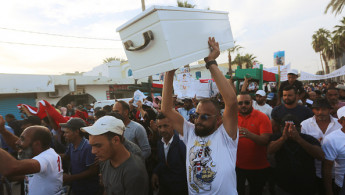After two months, Zarzis' anger over migration tragedy still simmers
Families in Tunisia's Zarzis have not yet lost hope in bringing justice for their missing relatives after two months since a migration tragedy rocked the southeastern city.
On Wednesday, hundreds took to the streets of Zarzis to demand the disclosure of the fate of their missing relatives after a boat carrying 18 migrants from Zarzis sunk in the Mediterranean Sea on 21 September. The bodies of nine of them are still missing.
Following the tragedy, relatives of the shipwreck victims protested on a weekly basis over "the dismissive government approach" to the disaster including an initial failure to send boats out to look for bodies and a failure to identify those found before burial.
The Tunisian Human Rights League said authorities had "not devoted the necessary resources to search and rescue operations in a timely way" and called for an inquiry into the burials.
Last week, the grieving families attempted to take their protests to the nearby island of Djerba where leaders of French-speaking countries held an international summit over the weekend.
Tunisian police have reportedly fired teargas to disperse the protestors' attempts to reach Djerba.
According to the Anadolu news agency, hundreds of people, including family members of the missing, set out in the morning of Wednesday from the commercial port in Zarzis towards the city centre, where a speech festival was held.
"Our main demand is to find the truth. We have given all information to the authorities and are waiting for the facts," Tunisian Civil activist Abd al-Salam Freek told the news agency.
The activist said the town will escalate its movement by a two-day general strike starting today, Thursday.
In October, President Kais Saied asked Justice Minister Leila Jaffel to open an investigation "so that Tunisians can know the full truth and who was behind these tragedies".
No updates about the state's investigation have been disclosed yet.
The economic hardship, worsened by the Ukraine war and Saied's power grab, drove thousands of Tunisian youth to risk their lives in 'irregular' migration as poverty and unemployment soared in the cash-strapped country.





 Follow the Middle East's top stories in English at The New Arab on Google News
Follow the Middle East's top stories in English at The New Arab on Google News
![Netanyahu furiously denounced the ICC [Getty]](/sites/default/files/styles/image_330x185/public/2024-11/GettyImages-2169352575.jpg?h=199d8c1f&itok=-vRiruf5)
![Both Hamas and the Palestinian Authority welcomed the ICC arrest warrants [Getty]](/sites/default/files/styles/image_330x185/public/2024-11/GettyImages-2178351173.jpg?h=199d8c1f&itok=TV858iVg)
